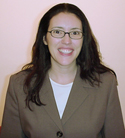- About MAA
- Membership
- MAA Publications
- Periodicals
- Blogs
- MAA Book Series
- MAA Press (an imprint of the AMS)
- MAA Notes
- MAA Reviews
- Mathematical Communication
- Information for Libraries
- Author Resources
- Advertise with MAA
- Meetings
- Competitions
- Programs
- Communities
- MAA Sections
- SIGMAA
- MAA Connect
- Students
- MAA Awards
- Awards Booklets
- Writing Awards
- Teaching Awards
- Service Awards
- Research Awards
- Lecture Awards
- Putnam Competition Individual and Team Winners
- D. E. Shaw Group AMC 8 Awards & Certificates
- Maryam Mirzakhani AMC 10 A Awards & Certificates
- Two Sigma AMC 10 B Awards & Certificates
- Jane Street AMC 12 A Awards & Certificates
- Akamai AMC 12 B Awards & Certificates
- High School Teachers
- News
You are here
Valerie Lopez-Zinzer

Valerie Lopez-Zinzer, A.S BS Mathematics Actuarial Analyst |
I began my career in mathematics in 1991. I graduated with a BS in mathematics with a strong core of actuarial science courses. Actuarial science is just one of the many exciting applications of mathematics. I currently work for Watson Wyatt, an international consulting firm. My responsibility is in pension consulting, although many other types of benefits consulting are within the realm of any large Human Resources consulting firm's capabilities. Pension consulting involves mathematics from start to finish. After choosing Watson Wyatt as consultants, a client entrusts us with establishing and administering its pension plans. We receive client data, and when I first started in this field, my job was to make sure that data are reasonable and accurate. The reasoning skills taught in math classes that enable you to have a hunch that an answer is right or wrong are precisely the ones that guide me in analyzing a client's data. The next step is our actual valuation process. In order to value a pension plan, we determine that an employee has reached a certain age, has a number of working years of service, and has an earning history with the company. This basic information is used to calculate the benefit this employee would earn if he or she retired at the time of the valuation process. But, since the person is not retiring today and probably may retire at age 65, statistics and probabilities enter into the equation. Those statistics include the person's chance of living to age 65, not quitting until age 65, or not becoming disabled until that person retires. From these pieces we convert our benefit into a present value. In addition to these probabilities, we must take into account the time value of money in calculating this person's present value. These concepts are applied to each of our client's employees. Once we've completed a valuation, we issue a report to our client explaining how much that client must contribute to its pension plan and how well funded the plan is. We may also report to the client the values to be reported in its financial statements. In the post-Enron universe, pension plans are just one of a litany of corporate programs that have a larger presence in a company's Annual Report than it did when I first started working as an actuary. Another interesting application of mathematics is occurring more frequently as interest rates have declined and companies have lost the ability to properly fund their pension plans. I recently became involved in the plan termination process, a complicated process whereby a company decides whether to have a pension plan. As interest rates have declined, the cost to companies has increased, making companies choose between pension plans and bankruptcy, or no pension plans and solvency. The actuary becomes a "jack-of-all-trades" during these procedures because a knowledge of law is necessary as well as a strong foundation in mathematics. Overseeing a plan termination is a complex process requiring the skills developed in math classes for combining lots of information, remembering lots of detail, and understanding complex formulas. As my career has progressed, I've gotten much more client interaction.When I advise students exploring this field, I'm usually asked "you deal with a lot of numbers, don't you?" Yes, in some regard, I do. But, I'm an advisor to my clients and the "numbers" are one piece of the puzzle. A lot of my work is reviewing the work of others and my experience allows me to make quick assessments of whether the results we plan to deliver to a client are reasonable. Which reiterates my point aboutthe value of math classes where I learned critical reasoning skills? But, just as no two people are the same, no two clients are the same and what works for one, may not work for another. An actuarial consultant must be nimble enough to know the difference and to propose solutions and advise on pension plan strategies that make sense. This is why, actuarial consulting isn't "just about numbers" and this is the insurance against boredom in the profession. The actuarial science field is one I enjoy because it allows me to combine several skills. An ability to explain complex ideas in both written and spoken form is crucial in addition to the ability to understand complex mathematics. The skills of a lawyer, accountant, and public speaker are ones that also make a successful actuary. If your strengths are not limited to mathematics, a career in actuarial science might be of interest to you as it has been to me. |




